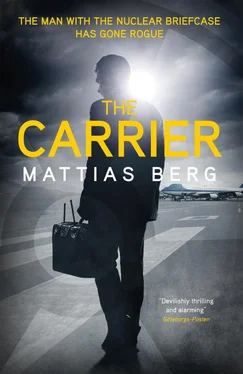Mattias Berg - The Carrier
Здесь есть возможность читать онлайн «Mattias Berg - The Carrier» весь текст электронной книги совершенно бесплатно (целиком полную версию без сокращений). В некоторых случаях можно слушать аудио, скачать через торрент в формате fb2 и присутствует краткое содержание. Город: London, Год выпуска: 2019, ISBN: 2019, Издательство: MacLehose Press, Жанр: Триллер, на английском языке. Описание произведения, (предисловие) а так же отзывы посетителей доступны на портале библиотеки ЛибКат.
- Название:The Carrier
- Автор:
- Издательство:MacLehose Press
- Жанр:
- Год:2019
- Город:London
- ISBN:978-0-85705-788-4
- Рейтинг книги:4 / 5. Голосов: 1
-
Избранное:Добавить в избранное
- Отзывы:
-
Ваша оценка:
- 80
- 1
- 2
- 3
- 4
- 5
The Carrier: краткое содержание, описание и аннотация
Предлагаем к чтению аннотацию, описание, краткое содержание или предисловие (зависит от того, что написал сам автор книги «The Carrier»). Если вы не нашли необходимую информацию о книге — напишите в комментариях, мы постараемся отыскать её.
The Carrier — читать онлайн бесплатно полную книгу (весь текст) целиком
Ниже представлен текст книги, разбитый по страницам. Система сохранения места последней прочитанной страницы, позволяет с удобством читать онлайн бесплатно книгу «The Carrier», без необходимости каждый раз заново искать на чём Вы остановились. Поставьте закладку, и сможете в любой момент перейти на страницу, на которой закончили чтение.
Интервал:
Закладка:
Because it looked as if what Blu was doing was conducting events—which turned out to be the case. With his long arms and eloquent hands he set the whole course of events in motion.
The dark humming rose from the women in black, who, maybe inspired by the Mothers of the Plaza de Mayo in Argentina, were perhaps campaigning for the health of their children and grandchildren after the warnings about the risks posed by the parabolic antennae. The sound spread through the gathering, in a widening circle by the perimeter fence, dull and rhythmic like the chorus in a Greek drama. Only when it had reached all the way back to me and Ingrid, somewhere in the middle of the crowd, could I distinguish the two words. Even my Italian was good enough for that: I remembered the phrases from my mother’s obsession with opera. The message could hardly be plainer.
“ Maledetto , Malefatto ,” the crowd chanted, over and again.
“A cursed and evil construction,” Ingrid muttered to herself, or perhaps to me.
Yet the show had to go on: the Defense Secretary’s speech, the inauguration, the authorities’ own manifestation. At precisely 1300 hours the fireworks started, just to demonstrate that we had the ability to put on light shows which could be seen even when the sun was at its zenith here in Sicily. Then it was the turn of the Secretary, just as the last ear-shattering explosions were fading away, at exactly ten after.
He played his role perfectly, pretended not to notice the women’s dull refrain now coursing rapidly throughout the immense crowd. The security troops stood still as the drones hovered above our heads.
The Secretary, or his double, said just what was expected of him. Played to his strengths. Empty phrases for the media about global security and addressing the terrorist threat. M.U.O.S. not only making it possible to co-ordinate global military forces, but also radically increasing each individual soldier’s possibility of survival during complex operations.
This was not what the activists wanted to hear. The ability to wage war more easily, anywhere on the earth’s surface. The new communications technology as the spearhead of something that nobody could yet oversee—and with the worrying side-effects of the powerful antennae.
Yet the answer from the crowd cannot have been what was expected. No furious booing, shrieks or howls, as at Kleine Brogel. Just that continuing dull, dark chant, the two words, four syllables each, rhythmic and foreboding. Ma-le-de-tto … Ma-le-fa-tto … Ma-le-de-tto …
Until the chorus suddenly stopped, at exactly the same time as the Secretary reached the end of his speech. That was the signal. And Blu jumping back down onto the ground outside the fence.
As he stood in front of the specially trained troops, our hardest-drilled forces, I did not need the field glasses to make out their fear, despite the machine guns at their chests and the high-tech armor covering them. You could tell from their postures, the theater of the body. How they recoiled before that little man with his only weapon a devil’s mask. How the soldiers themselves put on their masks, folded down the riot helmet visors, assumed their roles.
And then everything let go. The collective energy of the hundreds of thousands of activists was like a small nuclear charge. An ear-shattering roar of abuse and exaltation. A triumphant primal scream rising from the plain straight up toward the drones in the sky.
And if it had not been clear to me which strategy the military would be adopting when the time came, it became very obvious as soon as the special forces commanders stepped to one side—so that Blu could be the first of us all to get into the base.
Because a crowd of that size heading in one direction is a force of nature which cannot be resisted, unless one is prepared to use a level of violence which would be enough to turn public opinion very hostile. We had learned to measure the power of the crowd in terms of an equivalence with herds of buffalo, goods trains or steamrollers: calculating what Edelweiss called the Onslaught Effect.
As the front rows poured through the gates, thoughts of other historical processes from our times flashed through my mind. The fall of the Berlin Wall, perhaps the Orange Revolution in Ukraine, the Arab Spring. Events where the odds faced had been at least as high. Where one party had had such a hold on power, the arms were as unequally divided, the security forces both organized and strong. But where the undercurrents had been almost as impossible to foresee.
This nearly pacifist strategy was of course made all the easier for the military by the media’s presence. The fact that all the journalists and photographers had dared to mingle with the activists, were rushing around with their cameras and notebooks, penetrating ever further into the burlesque chaos of fancy dress and heavily armed special forces. As at Kleine Brogel—but on an even larger scale here, with even more people in uncontrolled motion—there was quite simply no alternative but to admit us all. Despite the huge strategic importance of the installations.
Ingrid and I let ourselves be washed along in the wave. Ran quickly but carefully over a collapsed fence, giving the razor wire a wide berth: it had already injured a number of people on the way in, cutting open clothes and flesh on any who were not aware of its multiple function, how it grabs onto things as well as slicing into them.
Blood from the activists’ lacerated calves and thighs could be seen against the pale gray of the cement flooring inside the gates. But still the tide of people kept rolling forward. Surging, spreading out in all directions at once, like water or gas.
One might think that a mass like this is a single flood wave, streaming in a certain direction. And in this case there must have been tens of thousands moving from the gate all the way over to the gigantic parabolic antennae—soon to be made famous by the direct transmissions of the T.V. companies’ morning reports.
But Edelweiss used to stop the reels during his lectures on mass psychology, winding forward and backward to demonstrate that only rarely was there any collective movement. Many of those who were now here, dragged along without any clear idea of what they were doing, would certainly have liked to turn back had they been able, were not after all willing to risk so much for their ideological convictions. Some others had already been panicked by the crush. Yet more had specific objectives, such as picking up some trophy from within the base.
The secret lay not so much in understanding that a mass heading in a certain direction always contains people moving against the flow—but rather how they do so. And then to match one’s own movements scrupulously to this pixelated pattern.
Ingrid showed herself to be a master of just this. We were therefore able to move both with and against the swarm toward the eastern periphery of the facility, while the main wave surged toward the western part, where the M.U.O.S. antennae stood brooding on their secrets. One Lucia among certainly hundreds, perhaps more. One bearded martyr lost in a crowd of them. Without anybody apparently taking any notice of us.
The sweat was now itching inside my beard and costume. Not even Jesús María’s perforated fabric wicked enough of the condensation in what must have been approaching 104 degrees in the boiling sun. I did not take the time even to glance at my wristwatch, only kept looking straight ahead, following Ingrid’s sure course through the sea of people. The hot wind lifted us forward, until I caught sight of our objective a few hundred feet ahead, through the chaos of costumed people. Everything grew quiet around me. I felt the hybrid against my body. Saw the whole train of events like a simulation on a computer screen. The activists, the soldiers, the choices of route open to us.
Читать дальшеИнтервал:
Закладка:
Похожие книги на «The Carrier»
Представляем Вашему вниманию похожие книги на «The Carrier» списком для выбора. Мы отобрали схожую по названию и смыслу литературу в надежде предоставить читателям больше вариантов отыскать новые, интересные, ещё непрочитанные произведения.
Обсуждение, отзывы о книге «The Carrier» и просто собственные мнения читателей. Оставьте ваши комментарии, напишите, что Вы думаете о произведении, его смысле или главных героях. Укажите что конкретно понравилось, а что нет, и почему Вы так считаете.












